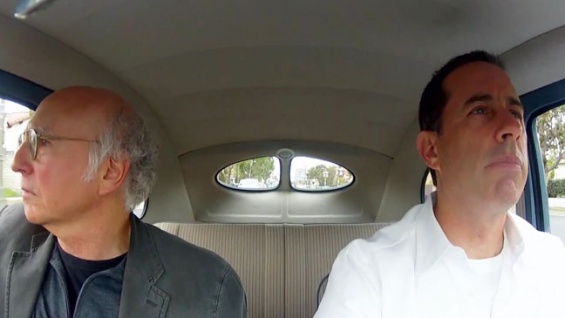Jerry Seinfeld, continuing his endless, ostentatious victory lap, hosts the ambulatory Internet talk show, Comedian in Cars Getting Coffee, which features caffeinated cut-ups in souped-up sedans. As much as I love comedy and generally enjoy the program, there’s something about it that bothers me. I mean, in addition to the fact that the guests are almost always white males. (Tina Fey, a guest this season, is rumored to have a vagina, but so far she’s only flashed us the tits.) No, what’s disquieting to me about the show is that I don’t like seeing comics when they’re not doing comedy. They’re often not very interesting. In Seinfeldian terms, there’s a reason why the comic book is called Superman and not Clark Kent. Stripped of their powers, these people are a lot like you and I, but even worse. When the show works on a higher level, however, as it does in the Michael Richards episode and the one with Carl Reiner and Mel Brooks, it’s special.
Perhaps there’s another reason the program is such an odd thing: the wasteful, careless ethos of the Seinfeld sitcom feels strange in a time of so much financial struggle. From Oliver Burkeman at the Guardian:
“A competing theory for Seinfeld’s low profile since 1998 is that his comedy belongs squarely to the 90s – an era of economic plenty, before 9/11, before widespread anxiety about climate change, when the bottomless self-absorption of Jerry, Elaine, George and Kramer felt excusable. Rewatching the show today is a curious experience. The haircuts are terrible, obviously. But the much-hyped focus on ‘nothing’ – on overblown conflicts with doormen, restaurateurs and so on – feels familiar: it’s central to many of the shows that count Seinfeld as a major influence, from Arrested Development to The Office to Curb Your Enthusiasm. (The latter’s success fuelled yet another theory about Seinfeld’s post-90s career: that Larry David had been the genius behind the sitcom all along.) What stands out, in those old Seinfelds, is the weird callousness: a total lack of concern with anyone other than the central foursome, unmatched even by Larry David’s character in Curb, or David Brent, or the South Park kids. When George’s fiancee dies, poisoned by the glue in the cheap wedding invitations he’d insisted on buying, his pure relief is certainly funny, and in keeping with the famous motto of the show’s writers: ‘No hugging, no learning.’ But it’s also more pathologically egocentric than anything you’d encounter, in a comedic context, on TV today.”
Tags: Jerry Seinfeld, Oliver Burkeman, Tina Fey

